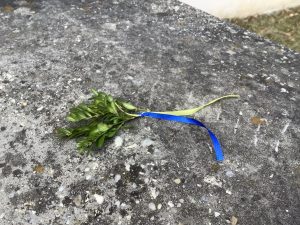“Not a crisis, not a conflict, war.”

von Anabel Kobylinski
In the previous weeks, the students at our school had the opportunity to have an exchange with Svitlana Khodakovska who fled from Ukraine at the beginning of march. Svitlana does not pursue any political aims, her goal is to inform students about the situation that she experienced firsthand. Despite not being at home anymore, Svitlana is still pursuing her profession, which is teaching English to French students; the lessons are currently held online. The present situation is tough, not only for those who are still in Ukraine. Svitlana has two sons, 20 and 24, who must, as well as her husband, remain in Ukraine. They are liable to military service. However, she is still content that she will be able to return to Kyiv.
“Freedom is worth fighting for”
What constitutes a democracy? The answer of most students: fair elections, freedom of expression, respect for human rights – things that we often take for granted. In February 2014, Ukrainian students protested against the pro-Russian president Yanukovych. Several hundreds of these activists brutally collided with the police, although they avoided using any violence. Protesters opposed what they saw as abuse of power of Yanukovych and the government – which resulted in them being violently silenced. Yanukovych was in office for a total of five years, following his pro-Russian principles and striving towards Ukraine being one with Russia again. This is not democracy. Now, Ukraine does not need to be “saved” either, the people still want to fight for their freedom and live peacefully on their own land. But while thousands of people are stuck in Mariupol, fearing Russian troops, Ukraine does need support from other countries: either humanitarian aid and/or military assistance.
“Listen to me carefully. In 2022, a child died of dehydration.”
The conflict between Ukraine and Russia has been around for more than eight years now, it has been going on in the eastern parts of the country, but now, the Russian invasion on the 24th of January is not only focusing on parts, but all of Ukraine. Bombs fell on children’s hospitals; maternity houses were destroyed; civilians are being attacked: President Zelensky speaks of homicide – and Russia still denies the scope of the attack. While cities are under constant bombardment, people must hide in basements and bathrooms – grocery stores are empty, the infrastructure has been destroyed. More than 50 children have already died in the war, more than two million refugees have already left the country.
Towards the end of the presentation, it became apparent how many questions we each had: How should we deal with the situation at school? How is Svitlana dealing with the fact that her family is still in Ukraine? We can see how important candid conversations are – both in everyday situations as well as in times of crisis. We would like to thank Svitlana for sharing her own experiences, background information on the war and an open ear for our questions.

